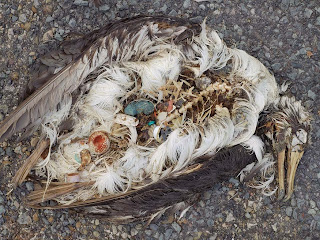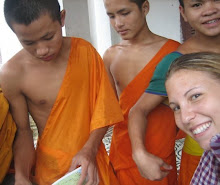
“What is your good name?” So starts a conversation as I wait for the bus to take me from Islamabad to Lahore. By now I have dropped my suspicions that naturally guard me as a Westerner in a foreign land I know little about besides the one word that the media have echoed in my mind: terrorism. People are simply curious to know what has brought me to Pakistan and eager to hear my impressions of their homeland.
I have arrived two weeks prior from India. Though the two countries were once joined, they have clearly evolved into two distinct cultures and I am surprised to discover Pakistani cities that are cleaner and somewhat better organized than Delhi is. In terms of infrastructure even, it seems electricity is more widespread and is already back on in some villages that were just a few weeks ago still under 8 feet of water - though many houses remain destroyed.
My first night in Karachi is a surprising welcome to the Islamic Republic of Pakistan. I am picked up by a friend of a friend...of a friend – I would soon get to know these extended relationships are enough to serve as an entry card in any city – friends, cousins, or distant relatives are always happy to offer a place to stay, a warm cup of chai, or a nice meal. (The hotel industry is doomed).
My host has had to fly to another city at the last minute but is graciously letting me stay at her place- though we’ve never met- and has assigned her best friend to take care of me. The friend in question has recently returned from residency in the US and acquired quite a liking to alcohol. Just as teenagers in the West get thrilled by the forbidden aspect of it, my 25-year-old new friend is certainly no exception and I find myself waiting in his car for his bootlegger. The “dealer” arrives 20 minutes later on a motorbike and the exchange is over in a matter of seconds- I am clearly dealing with pros. Though I do not particularly fancy vodka with dinner, I feel I have just gone through an exciting story to tell, but can’t help to be a little disappointed when I realize we are far from being the only ones braving the law. I notice at the posh restaurant I am taken to, that most tables are similarly holding a bottle wrapped up in a napkin that barely hides its content. A week later I would be served wine at the private residence of prominent member of the ministry, surprised by what I first assume to be apple juice. Needless to say, just like everywhere else, rules are meant to be broken, and the elite is always the first in line to do so.
After just one night in Karachi, I head to Lahore, which has been recommended as a safer base and where I have yet more friends of friends to host me and take good care of me. I board the plane and find myself surrounded by a couple hundred of men, while I can count the women on my flight on the fingers of one hand. It soon becomes apparent that it’s not just on the planes that women are missing… it’s from the streets themselves. (Another – this time more negative- contrast with India where there is a clear emancipation of women).
It’s not that the women here are hiding, but they are clearly outnumbered in the public space – and when night falls they become even rarer. It’s subtle at first, but this lack of feminine presence does get to me. Though I believe it is slowly starting to change, as more women do enter the workforce and become independent – from their parents or from their husbands- it is a society where women’s mobility is limited and not necessarily welcomed. During my time in Pakistan, I often get the feeling it’s not so much being a foreigner (ie: white in a sea of browns) that gets me the most stares but in many contexts, being the sole woman in a world of men (but I suppose it is a mix of both).
Though women get educated, many – even among the well-traveled elite - give up any aspirations to a career as soon as they are pronounced married. It’s not the lack of help to raise the children (there's always family or servants for that), it’s simply that there is no need or interest. Husbands provide, and status/agency is not so much associated with a career - the way it has become for women in the West or in neighboring India - as much as it is with a good marriage and the bearing of children (boys preferably). A telling example: 70% of students in medical school are women, but only 20% end up practicing. (This has severe repercussions, among them, lack of medical staff in isolated areas).
That said, the women who do work and have careers are amongst the feistiest and most strong will-powered women I have ever met. They are ambitious and hard working and stand-up for themselves with their heads held high. And while many men do not want their wives to work, there does not seem to be much obstruction at the macro/societal level for women to do so. Pakistan was after all the first Muslim state to elect a woman leader – Benazir Bhutto in 1988– something that many countries in the West have yet to accomplish.
I never had any problems interacting with Pakistani men, despite my initial concerns. I’m ashamed to admit it, but Muslim bearded men used to scare me. Or at least they made me feel uncomfortable as I boarded the plane to take me to Pakistan, surrounded by hundreds of them. Like myself though, the two other white people on my flight from Kathmandu had been upgraded to business class (a way to ease our way in?). I could see through the closed curtains men taking turns to pray in the small space between our cabin and the cockpit and thought to myself how ironic it was to be a minority in a plane full of men who no doubt would have been questioned at any Western airport. But I have now had enough experience to know that these men are kinder to a foreigner than we would ever be to them in our own country.
A couple weeks into my stay, I am invited to film at a madrassa. I meet up with two Imams the day before who insist I am welcomed in their country as family. I ask through my interpreter to make sure they are comfortable having me – a foreign woman- film. The Imam answers me directly, in English, “we feel very comfortable, as long as you are”. I smile and nod but they continue to stare at me, waiting for a proper answer. I finally provide, which gets me a deserved “that took you a long time to think about!”. Everyone laughs.
The next morning, as I walk through the madrassa’s courtyard, passing surprised students, I realize my red kurta was probably not the best wardrobe choice considering the discreet white uniforms worn by all students. But despite 2000 pair of eyes on me, I feel at ease. This is also despite the fact that this particular madrassa was the site of a suicide bombing barely a year prior, that killed the current principle’s father, who had taken a hard stance against the Taliban.
Indeed, while Pakistan defines itself an Islamic Republic, it is a liberal Islam that in no way resembles that of the extremist position taken by a very small group of young men in the country, more likely guided by their marginalization by the government than any real religious conviction. The religious political party remains a minority. The media have complete freedom and take full advantage of it – their favorite pastime: bashing President Zardari (Benazir Bhutto’s widower).
It is unfortunate that Pakistan’s reputation has been overshadowed by terrorism. True, there are terrorist attacks in or originating from Pakistan. But it is deeply unfair to reduce an entire society of welcoming people, a country with a rich history and culture - to a sensational headline. On November 11, when another bomb blast hit Karachi, I was enjoying being pampered with my friends at a beauty parlour in Lahore. A mundane activity maybe, but another story to Pakistan.
Every week-end, in Lahore, a group of people get together as a Critical Mass, cycling around the city. Every day, dads bring their daughters to school all crowded on one bike; modern teenagers get their ice-cream sundaes fix at a Hot Spot joint, where walls are covered with B-movies posters, while slum kids run around barefoot by the train tracks, owning nothing but the smile on their face. Meanwhile hijras collect unpaid taxes for city officials or stand at streetlights, hoping for charity.
Around Pakistan, ordinary people are taking it upon themselves to make their country a better place. From young men and women uniting to launch a green movement, to retired army men organizing food and clothes drives to deliver hundreds of care packages to victims of the flood. There are many stories to Pakistan. Though I’ve barely had a chance to scratch the surface, I look forward to the opportunity to be back, InshAllah.















